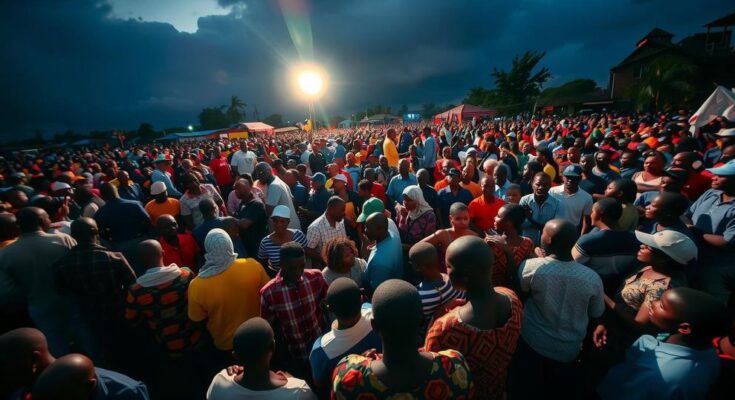Thousands in Mozambique gathered for the funeral of opposition lawyer Elvino Dias, murdered amid election tensions. Opposition leader Venancio Mondlane called for 25 days of protests against perceived electoral fraud, while investigations into the killings are underway. The legitimacy of the elections is under scrutiny, with low voter turnout potentially undermining results as the ruling party appears poised to win.
On Wednesday, thousands gathered in the vicinity of Maputo, Mozambique, to lay to rest the murdered lawyer of opposition leader Venancio Mondlane. This event transpired amid heightened tensions as the nation anticipated the election results from the October 9 ballot, which are expected to favor the ruling Frelimo party. Mondlane alleged that security forces were responsible for the killing of his attorney, Elvino Dias, and another associate, Paulo Guambe, as they prepared a case against the election results. Mondlane announced a call for 25 days of protests in response to Dias’ murder, asserting that the election results would be rendered “false.” Large crowds congregated at a local church prior to the burial at Michafutene cemetery. In a poignant message communicated via Facebook, Mondlane condemned the ambush that led to the death of his lawyer, declaring intentions to instigate “25 days of terror” in retaliation. The police confirmed that an investigation is ongoing regarding the killings while the Frelimo party, which has held power for nearly half a century, denounced the incident as a “macabre act.” The government has urged for calm as the official election results are awaited. Mondlane previously faced police resistance during a protest on Monday, where tear gas was deployed after his call for a general strike against perceived electoral fraud and the murder of his lawyer. The legitimacy of the elections has been contested, with European Union observers noting irregularities in the vote counting and adjustments made to results at various polling stations. Furthermore, indications of low voter turnout in Mozambique, a nation of approximately 33 million, may undermine the credibility of the election. President Filipe Nyusi is exiting the political scene after his two constitutional terms, and Daniel Chapo from Frelimo party is anticipated to succeed him, alongside other candidates including Ossufo Momade of Renamo and Lutero Simango of MDN. The emergence of Mondlane and the Podemos party marks a new phase in Mozambican politics, with analysts highlighting their effective use of social media to engage the country’s youth, who are eager for change in the existing political landscape.
The current unrest in Mozambique is largely tied to the aftermath of the recent elections held on October 9. With the ruling Frelimo party anticipated to secure victory, opposition parties, particularly under the leadership of Venancio Mondlane, have raised allegations of election fraud and intimidation. The murder of Dias, Mondlane’s lawyer, has further exacerbated tensions, leading to unrest and calls for widespread protests. The socio-political climate is critical as Mozambique navigates issues of governance and electoral integrity, particularly amid growing youth engagement in political activism.
The developments in Mozambique illustrate a significant moment in the country’s political landscape, marked by protest and rising tensions. The accusations of electoral fraud and the violent death of an opposition lawyer have mobilized citizens and ignited demands for accountability. As the election results loom, the potential for civil unrest remains high, with Venancio Mondlane’s call for extensive protests signaling a shift in political engagement among Mozambican youth and opposition forces.
Original Source: www.arabnews.com




